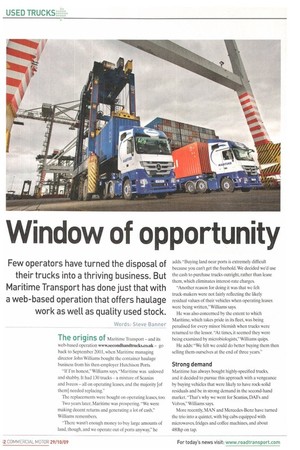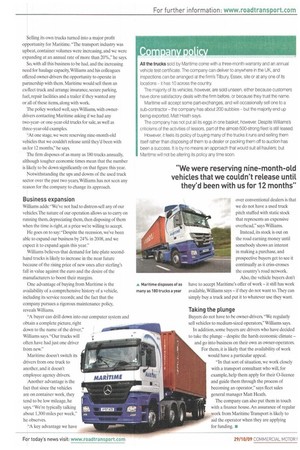Window of opportunity
Page 52

Page 53

If you've noticed an error in this article please click here to report it so we can fix it.
Few operators have turned the disposal of their trucks into a thriving business. But Maritime Transport has done just that with a web-based operation that offers haulage work as well as quality used stock.
Words: Steve Banner The origins of Maritime Transport — and its web-based operation www.secondhandirucks.co.uk — go back to September 2001, when Maritime managing director John Williams bought the container haulage business from his then-employer Hutchison Ports.
"If I'm honest," Williams says, "Maritime was unloved and shabby. It had 130 trucks — a mixture of Scanias and Ivecos — all on operating leases, and the majority [of them] needed replacing," The replacements were bought on operating leases, too.
Two years later. Maritime was prospering "We. were making decent returns and generating a lot of cash," Williams remembers.
"There wasn't enough money to buy large amounts of land, though, and we operate out of ports anyway," he adds. "Buying land near ports is extremely difficult because you can't get the freehold. We decided we'd use the cash to purchase trucks outright, rather than lease them, which eliminates interest-rate charges.
"Another reason for doing it was that we felt truck-makers were not fairly reflecting the likely residual values of their vehicles when operating leases were being written," Williams says.
He was also concerned by the extent to which Maritime, which takes pride in its fleet, was being penalised for every minor blemish when trucks were returned to the lessor. "At times, it seemed they were being examined by microbiologists," Williams quips.
He adds: "We felt we could do better buying them then selling them ourselves at the end of three years."
Strong demand
Maritime has always bought highly-specified trucks, and it decided to pursue this approach with a vengeance by buying vehicles that were likely to have rock-solid residuals and be in strong demand in the second-hand market, "That's why we went for Scanias, DAFs and Volvos," Williams says.
More recently, MAN and Mercedes-Benz have turned the trio into a quintet, with big cabs equipped with microwaves, fridges and coffee machines, and about 480hp on tap. ening its own trucks turned into a major profit opportunity for Maritime. "The transport industry was upbeat, container volumes were increasing, and we were ex anding at an annual rate of more than 20%," he says.
o, with all this business to be had, and the increasing ne d for haulage capacity, Williams and his colleagues ofIered owner-drivers the opportunity to operate in pa nership with them. Maritime would sell them an ex. fleet truck and arrange insurance, secure parking, fu 1, repair facilities and a trailer if they wanted any or all of these items, along with work.
lUbe policy worked well, says Williams, with ownerdrivers contacting Maritime asking if we had any -yearor one-year-old trucks for sale, as well as three-year-old examples 'At one stage, we were reserving nine-month-old vehicles that we couldn't release until they'd been with us for 12 months," he says.
The firm disposes of as many as 180 trucks annually, al ough tougher economic times mean that the number is ikely to be down significantly on that figure this year.
otwithstanding the ups and downs of the used truck se tor over the past two years, Williams has not seen any re son for the company to change its approach.
B siness expansion
ms adds: "We've not had to distress-sell any of our 'cles.The nature of our operation allows us to carry on g them, depreciating them, then disposing of them w en the time is right, at a price we're willing to accept.
e goes on to say: "Despite the recession, we've been allle to expand our business by 24% in 2008, and we expect it to expand again this year."
illiams believes that demand for late-plate second d trucks is likely to increase in the near future because of the rising price of new ones after sterling's fall in value against the euro and the desire of the manufacturers to boost their margins. One advantage of buying from Maritime is the a ilability of a comprehensive history of a vehicle, in hiding its service records; and the fact that the ccmpany pursues a rigorous maintenance policy, reveals Williams "A buyer can drill down into our computer system and obtain a complete picture, right down to the name of the driver," Williams says. "Our trucks will often have had just one driver from new."
Maritime doesn't switch its drivers from one truck to another, and it doesn't e ployee agency drivers.
Another advantage is the fa t that since the vehicles ar on container work, they te d to be low mileage, he sa s. "We're typically talking atout 1,300 miles per week," he observes.
"A key advantage we have over conventional dealers is that we do not have a used truck pitch stuffed with static stock that represents an expensive overhead," says Williams.
Instead, its stock is out on the road earning money until somebody shows an interest in making a purchase, and prospective buyers get to see it continually as it criss-crosses the country's road network.
Also, the vehicle buyers don't have to accept Maritime's offer of work — it still has work available, Williams says — if they do not want to. They can simply buy a truck and put it to whatever use they want.
Taking the plunge
Buyers do not have to be owner-drivers. "We regularly sell vehicles to medium-sized operators," Williams says. In addition, some buyers are drivers who have decided to take the plunge — despite the harsh economic climate — and go into business on their own as owner-operators. For them, it is likely that the availability of work would have a particular appeal.
"In that sort of situation, we work closely with a transport consultant who will, for example, help them apply for their 0-licence and guide them through the process of becoming an operator," says fleet sales general manager Matt Heath.
The company can also put them in touch with a finance house. An assurance of regular work from Maritime Transport is likely to aid the operator when they are applying for funding. •








































































































































